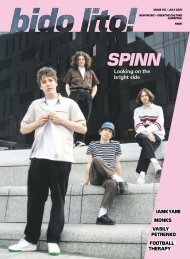Bluedot Volume1
Bluedot - a festival of discovery at Jodrell Bank | 22.23.24 July 2016. A preview magazine featuring interviews with Jean-Michel Jarre, Air, Public Service Broadcasting, Mercury Rev, The Infinite Monkey Cage and more. www.discoverthebluedot.com
Bluedot - a festival of discovery at Jodrell Bank | 22.23.24 July 2016. A preview magazine featuring interviews with Jean-Michel Jarre, Air, Public Service Broadcasting, Mercury Rev, The Infinite Monkey Cage and more. www.discoverthebluedot.com
Create successful ePaper yourself
Turn your PDF publications into a flip-book with our unique Google optimized e-Paper software.
THE INFINITE MONKEY CAGE<br />
When is a strawberry dead?<br />
You’ve probably never considered<br />
this before, even as you’ve chewed and<br />
digested one, washing it down with a<br />
dollop of cream and a slurp of Pimm’s.<br />
Thankfully, you don’t have to give it much thought as the<br />
plight of this most summery of fruits is a regular topic<br />
for discussion on the award-winning BBC Radio 4 show<br />
THE INFINITE MONKEY CAGE. Running since 2009, the<br />
massively popular show is steered through conversations<br />
that cover the whole gamut of scientific thinking with an<br />
irreverent yet respectful touch by its hosts, comedian<br />
Robin Ince and astrophysicist Brian Cox. The pair are<br />
regularly joined in these scientific diversions by academic<br />
and comedic guests – including some who are both<br />
academic and comedic – to pick apart the latest theories<br />
in our understanding of the world in a way that’s easily<br />
accessible and quite funny. Reality, climate change, the<br />
maths of love, artificial intelligence and race are all on<br />
the agenda, as well as the regular staples of quantum<br />
theory and cosmology. And strawberries.<br />
So how does a radio talk show about science come<br />
to command a global army of fans (‘Monkey Cagers’),<br />
regularly fill out auditoriums on live tours and become one<br />
of the BBC’s most downloaded podcasts – all without the<br />
aid of pretty pictures of stars and galaxies? Undoubtedly<br />
Brian Cox’s star appeal (geddit?) is a major factor, as<br />
is the stature of their guests: Richard Dawkins, Stephen<br />
Fry, Patrick Stewart and Alan Moore have all ventured<br />
inside the Cage at various points. But to dismiss the<br />
show’s popularity as being solely down to Cox’s celebrity<br />
presence is to miss the point about our own curiosity and<br />
desire for knowledge. “That’s a real underrated thing,”<br />
says Robin Ince in response to this question about human<br />
inquisitiveness. “There’s been a huge presumption of the<br />
stupidity of people and the lack of curiosity, but if you<br />
give them something to be curious about, I think more<br />
often than not they will rise to that.”<br />
There’s also a lot to be said for the hosts’ chemistry in<br />
why the Monkey Cage proves so popular, which brings a<br />
Pythonesque edge to proceedings. Ince frequently pokes<br />
fun at Cox’s ‘rock star’ past and newfound popularity<br />
as the poster boy for popular science, while Cox seems<br />
to enjoy being let off the leash to tackle new problems<br />
and quiz guests with youthful glee. English and Drama<br />
graduate Ince also acts as a bridge for the lay listener<br />
without a scientific background: what he calls a “keen<br />
idiot” – someone who’s very interested in science, but<br />
doesn’t know very much about spontaneous symmetry<br />
breaking in the electroweak sector of the standard model.<br />
Put simply, the beauty of the Monkey Cage is that they<br />
make ideas just exciting enough that you want to go the<br />
next step yourself.<br />
“One month you’re getting letters<br />
from farm labourers, the next month<br />
you’re getting a note from someone<br />
who’s won a Nobel Prize”<br />
“You can be serious without being po-faced, and you<br />
can also be frivolous sometimes with big ideas,” says<br />
Ince. “And we’re not trying to do anything more than just<br />
excite people as much as Brian and I are excited by the<br />
idea ourselves, and I think that’s why it works. Overall,<br />
the passion and the genuine excitement about ideas<br />
will infect people. What we’re hoping is that people go<br />
‘Oh, right, I need to know more about that’.”<br />
“We don’t really script it,” continues Ince in explanation<br />
of the loose, relaxed feel of the shows, which stops them<br />
feeling too weighty. “Basically, we sit down and decide<br />
what the various ideas and themes are going to be for a<br />
series, and then we just leave it. When we’re recording,<br />
we normally don’t get past the first section, but we always<br />
imagine there’ll be this almost narrative-arc of science…<br />
but then Brian asks the wrong question first and we’re all<br />
over the shop.”<br />
This is an approach that encourages you to open<br />
your mind to things you’ve not considered before – like<br />
gravity being a quirk of the curvature of spacetime rather<br />
than an actual force. It also attracts a fairly eclectic<br />
range of interested listeners, as Ince explains: “We get<br />
people who are your Radio 4 listeners – you know, a<br />
53-year-old listening to The Archers while painting their<br />
croquet set, or whatever it is – and we actually get truck<br />
drivers writing to us because they listen to it at night;<br />
they’ve either downloaded it<br />
or sometimes they’re listening<br />
to it on the late-night repeat.<br />
One month you’re getting<br />
letters from farm labourers, the<br />
next month you’re getting a<br />
note from someone who’s won<br />
a Nobel Prize.”<br />
It must be a fine line to<br />
tread, therefore, in treating<br />
their listeners with respect and<br />
not coming across as overly<br />
preachy. “We weren’t overly conscious about it [from<br />
the outset], but we wanted to make sure we didn’t talk<br />
down to people,” Ince confirms, which mirrors the way he<br />
views his stand-up routines. “I think, in terms of the way<br />
that I approach an audience, it’s the same; which is<br />
that I don’t presume. We wanted to make the kind<br />
of show – and I think I hopefully do the same in<br />
stand-up, and Brian does the same in his documentaries<br />
– which is, you give everyone enough information<br />
that they are able to get some kind of image, some<br />
kind of vision, some kind of understanding of what is<br />
going on.”<br />
With The Infinite Monkey Cage’s next appearance<br />
coming live on the main stage at bluedot, it would be safe<br />
to assume that the subject of Brian Cox running around<br />
on the dish of the Lovell telescope in a music video will<br />
be on the script. “Oh, of course I’ll be mentioning that<br />
D:Ream single no one remembers,” laughs Ince, who has<br />
his own reasons for feeling that this particular Monkey<br />
Cage will be a special one. “The last time I can remember<br />
having that sensation – that really physical sensation, in<br />
your mind, in your stomach – of seeing something of such<br />
beauty, was the Grand Canyon! And the Lovell telescope<br />
is something man-made by humans, and it’s remarkable.<br />
You are looking at a lot of human minds and a lot of<br />
endeavour, and you’re looking at something that came<br />
from a war; something that has the ability to pick up those<br />
radio waves, to understand pulsars and quasars, that’s<br />
rooted in some of the worst sides of humanity – but still,<br />
something that positive comes out of it.”<br />
Now, about those strawberries…<br />
infinitemonkeycage.com<br />
WRITTEN BY CHRISTOPHER TORPEY<br />
LOVELL STAGE<br />
FRIDAY<br />
32 | EXPLORE


















